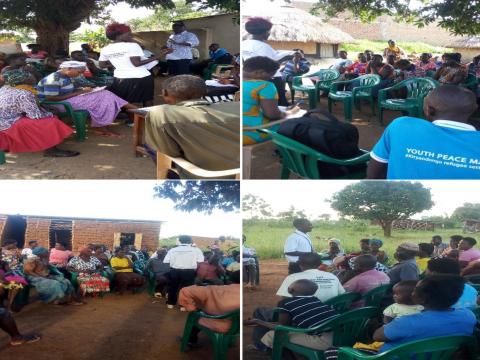In the past few weeks, youth peacemakers from the Whitaker Peace & Development Initiative (WPDI) have worked hard to promote peace and reconciliation in and around the Kiryandongo Refugee Settlement. Through so-called community dialogues, they have brought thousands of community members together to discuss important issues including conflict resolution, gender equity, and how to create stronger communities in the area. As a local government official testified, “because of the WPDI program, we have witnessed a reduction of incidences of violence, conflict, and gender-based violence between refugees and the host community.”
November 2018 – Recently, WPDI youth peacemakers in the Kiryandongo Refugee Settlement and its surrounding areas have held dozens of community dialogues, designed to build peace, resolve conflicts, and educate the public about important ongoing issues there. This effort was led by the 46 leaders of WPDI’s Youth Peacemaker Network – our flagship program – which aims to provide young people with the tools they need to become agents of peace in their communities so that they can affect real change in them. To achieve this, we provided them with a year of intensive training in topics including peacebuilding, conflict resolution, negotiation, life skills, information and communications technology, and business and entrepreneurship skills. This training allowed them to become leaders in their communities, into which they return to become high impact peacemakers and entrepreneurs.
Holding community dialogues is a key way our youth peacemakers transform their communities. In 2018, they conducted more than 60 community dialogue and educational meetings, working in concert with partners such as UNHCR, local schools, governing authorities, community leaders, and other stakeholders. These events have gathered this year nearly 3,000 people in an attempt to build peace by influencing attitude changes among communities of diverse ethnicities and cultures. In so doing, they have addressed issues of different dimensions, ranging from tribal conflicts, fights among the main conflicting tribes (Dinka and Nuer), discrimination of different forms, gender equity, dominion by majority tribes over the minority ones, sexual gender-based violence, alcoholism and substance abuse, theft and burglary, and prostitution.
These dialogues have proven to be remarkably successful and show just how integrated WPDI’s youth peacemakers are in their respective communities. A recent effort – held in conjunction with a union of South Sudanese refugees – addressed long-standing cultural attitudes in South Sudan concerning girls and the belief that they are not be seen in public and should instead consign themselves to domestic chores. A total of 56 communities and ethnic groups were brought together and united to address this issue, which was a success in itself. Working along these lines, WPDI currently supports three new female football teams comprised of 60 girls from the settlement. They regularly play with and against boys – something unheard and unseen which is, yet, tremendously empowering for everyone.
In another instance, a weekly dialogue held between the community leaders of the Bul and Dok clans of the Nuer community – which used to have tense relations with one another – yielded a similar result. A mediation process, led by WPDI youth peacemakers, resulted in both sides signing an agreement to unify the various clans of South Sudan, and, together, submit a request to the Kiryandongo District Local Government to allow them contribute to an educational campaign held over radio through Kibanda FM, a local station situated in the district. 
Local community leaders certainly appreciate the efforts of WPDI’s youth peacemakers. As Sayid Ayub, a community leader from the Nubian community, noted “I am extremely grateful to WPDI for the community dialogue program. It has improved and strengthened relationships between communities. Violent confrontation is no longer common and community members are encouraged to embrace peaceful coexistence.” A local church pastor concurred, telling us that “the WPDI team has successfully changed the mindset of community members, local leaders, youth leaders, women, and young girls. They now prioritize peace before conflict.”
Before they conducted community dialogues, conflict among various ethnic and community groups was a rampant issue with no peaceful solution in sight. Now that the local populace has an outlet in which they can discuss important issues, the Kiryandongo Refugee Settlement and its surrounding areas are experiencing a much higher degree of peace. Women, youths, and other vulnerable groups have been empowered and have been engaged to be more accountable. We are proud of all of our youth peacemakers and their accomplishments.